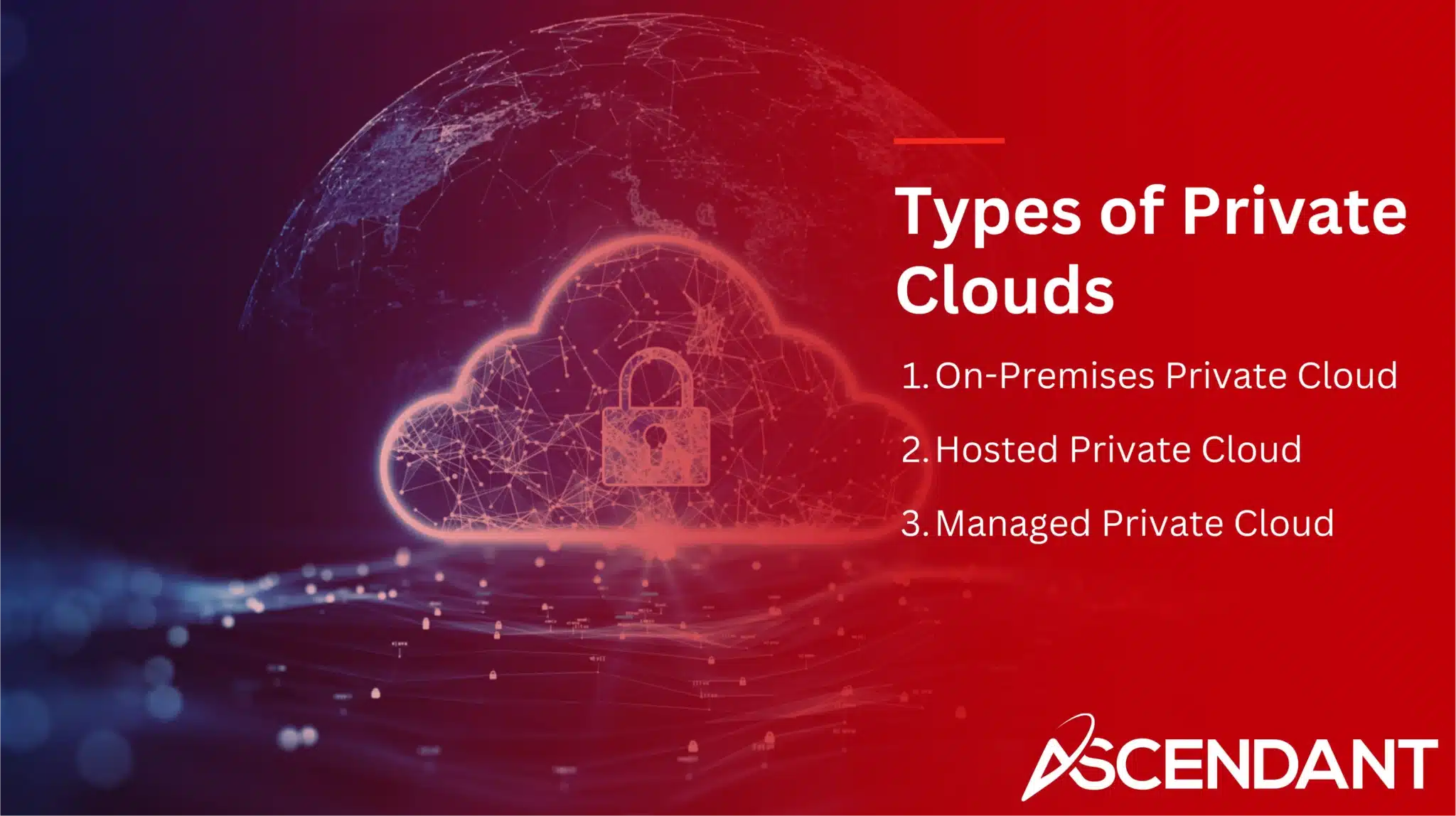Curious about the private cloud and its advantages for your business? A private cloud offers dedicated cloud infrastructure, providing enhanced security and control. This guide covers its main features, operations, types, benefits, and potential downsides.
Key Takeaways
- Private clouds offer enhanced security, control, and dedicated resources tailored for organizations with stringent compliance needs, distinguishing them from public cloud models.
- Organizations can choose from various types of private clouds, including on-premises, hosted, and managed solutions, each offering unique levels of customization, flexibility, and control.
- While private clouds provide significant benefits such as cost efficiency and scalability, they require substantial initial investment and ongoing maintenance, necessitating skilled IT personnel for effective management.
Defining Private Cloud
Cloud computing through private clouds offers an environment exclusively allocated to a single organization, as opposed to public clouds that serve multiple clients. The cloud infrastructure in private clouds is tailored for the solitary tenant use, ensuring superior security and resources committed solely to one entity. Such exclusivity brings about heightened control of the system, which positions private clouds as a prime option for firms demanding strict adherence to security protocols and compliance mandates.
Private cloud setups can either be situated on premises or supervised by external cloud providers. They emulate the adaptability, expansiveness, and self-service prowess characteristic of typical cloud solutions while guaranteeing that every resource is earmarked for just one organization’s consumption. With their ability to be extensively customized in line with particular technological stipulations, these environments equip companies with necessary capabilities essential for refining their operational efficiency.
Characteristics of Private Cloud
Private cloud platforms boast exclusive resources that promote peak performance for users. These platforms safeguard data by granting access solely to approved individuals, providing a superior level of security with public clouds. Such stringent control and enhanced protection are essential for entities dealing with confidential information.
An authentic private cloud platform provides the ability for self-service utilization along with sophisticated automation capabilities, affording enterprises complete control over their setups. This facilitates businesses in adeptly orchestrating their resources within private clouds and overall cloud infrastructure according to their unique requirements.
How Private Clouds Work
Private clouds operate on an integrated cloud management framework, empowering enterprises to effectively orchestrate their IT assets. The underlying architecture includes a series of exclusive physical servers, precisely customized for the enterprise’s unique requirements. Such an arrangement grants private clouds the flexibility to handle diverse workloads, encompassing essential business operations applications as well as traditional and modern software, Kubernetes ecosystems, and artificial intelligence innovations.
The central feature of private clouds is the software stratum that aids in managing data sets, application portfolios, and overall cloud infrastructure. This layer gives administrators complete oversight over how resources are allocated while facilitating seamless integration with pre-existing systems along with proficient control over data traffic patterns, all contributing to a robustly functioning secure cloud network.
To accommodate expanding needs or scale down surplus capacity efficiently within these private environments – additional server units can be procured via automated services. This elasticity ensures resource availability aligns effortlessly with evolving organizational demands.
Virtualization in Private Clouds
Virtualization is a key component in the establishment of private clouds, enabling organizations to generate virtual versions of physical hardware. This process fosters efficient use of dedicated resources within single-tenant environments, ensuring that security and control are preserved while allowing resource distribution across the organization.
While not as rapid as public clouds when it comes to scaling, private clouds offer adjustable resource management through virtualization that can adapt to changing demands. The equilibrium between scalability and command over their infrastructure renders private clouds appealing for enterprises facing variable needs.
Resource Management
Managing resources proficiently is crucial in sustaining the efficiency and performance of private clouds. Keeping track of metrics like CPU usage, memory utilization, and error rates for applications and servers is critical to gauge the wellbeing of cloud systems. Utilizing tools for monitoring performance plays a significant role in detecting issues that may cause delays, guaranteeing seamless operation of cloud services.
It’s imperative to handle resource distribution with precision when aiming to enhance cloud efficacy. Allocating computing resources judiciously according to business needs ensures that the private cloud environment remains sturdy and performs optimally.
Types of Private Clouds
There are various forms of private clouds, each distinguished by distinct features and advantages. The principal categories consist of:
- On premises private cloud
- Hosted private cloud
- Managed private cloud
Grasping these classifications is critical for entities to select suitable private cloud services that correspond with their operational demands.
Every kind of private cloud provides differing degrees of control, administration, and adaptability. Private clouds on premises are situated within a company’s own data center. Conversely, third parties manage hosted private clouds. External service providers handle the upkeep and operative assistance when it comes to managed privates in the realm of cloud solutions.
On-Premises Private Cloud
Hosted internally at an organization’s data center, an on-premises private cloud is managed by the in-house IT team. This arrangement provides optimal control and customization opportunities since virtualization technology enables the design of segregated environments that cater to particular requirements.
Hosted Private Cloud
Utilizing dedicated servers that are exclusively maintained by third-party vendors, hosted private clouds ensure that resources remain unshared with other organizations. This structure affords users their own managed cloud infrastructure while granting them full control over their data and applications.
The hosted private cloud setup not only provides scalability and high performance for heavy workloads but also allows businesses the agility to scale computing power as needed. These clouds can be seamlessly fused with public cloud services or specific dedicated servers, broadening their functional range to suit diverse business requirements. These solutions can be enriched through the integration of additional cloud computing services.
Managed Private Cloud
Cloud services known as managed private clouds are handled by an external service provider. This arrangement encompasses extensive management, which involves both deployment and maintenance tasks. The professional support offered allows companies to concentrate on their principal operations while enjoying the advantages of expertly managed cloud resources.
Key Benefits of Private Cloud
Utilizing private clouds offers companies numerous advantages such as improved flexibility, heightened control, increased security measures, and the ability to handle diverse workloads. These private cloud environments provide superior protection for sensitive data while helping organizations adhere to compliance mandates.
These environments are highly customizable to align with specific business requirements, which substantially boosts operational effectiveness. Private clouds also provide a balance of scalability and performance that rivals that of public cloud options but with the reliable foundation typically associated with on-premises solutions.
Enhanced Security and Compliance
In a private cloud environment, heightened control and security measures empower enterprises to adhere more effectively to rigorous regulatory standards. The preference for private clouds among organizations with stringent compliance needs stems from their segregated nature, which markedly diminishes the risk of data breaches and unauthorized access.
Private cloud infrastructures are pivotal for firms engaged in sensitive operations because they offer a fortified setting. This is achieved through various features including encryption, stringent access control mechanisms, consistent monitoring, robust firewalls, and multi-factor authentication protocols that collectively bolster data protection and facilitate adherence to compliance mandates.
Customization and Flexibility
Tailored resource allocation is a key feature of private cloud infrastructures, designed to meet precise performance requirements. This allows organizations to fine-tune their operations for optimal management and use of resources, thus boosting flexibility and operational efficiency significantly.
Cost Efficiency
Over time, businesses with predictable workloads may find that private clouds are a more cost-effective solution. When properly configured and utilized, the operational expenses of managing a private cloud can be less than those associated with public clouds.
It’s crucial to gain clear insight into cloud-related expenditures—including costs for hardware, maintenance personnel, and energy—to fully understand where financial resources are being spent. By focusing on cost management strategies within the cloud infrastructure, companies can allocate their resources more efficiently and budget effectively, which can lead to considerable savings.
Scalability and Performance
The use of virtualization technology within private clouds provides organizations the ability to allocate resources efficiently across different applications. By enabling on-demand scaling of these resources, companies can maintain optimal performance and adaptability without facing substantial capital expenses.
Potential Drawbacks of Private Cloud
Numerous advantages are associated with private clouds, but there are also substantial challenges that must be contemplated by interested users. Establishing a private cloud infrastructure entails a considerable upfront investment, presenting a significant economic obstacle for numerous organizations.
The upkeep of a private cloud incurs persistent operational expenses and demands the expertise of proficient IT staff to manage the system competently. Companies need to consider these initial and recurrent expenditures in relation to the enduring rewards of embracing private clouds when making well-informed choices.
High Initial Costs
Compared to the use of public cloud services, establishing a private cloud usually involves higher upfront capital expenditures. This is because organizations are responsible for all associated costs with setting up the infrastructure as well as its continuous support and maintenance.
Maintenance and Staffing Requirements
The continual expenses associated with the upkeep of private clouds can exceed those incurred by public clouds, irrespective of the chosen management approach. These maintenance costs are substantial whether they’re handled by internal IT teams or outsourced to external service providers.
Employing proficient IT personnel is crucial for managing a private cloud due to the need for persistent operations and support oversight. The intricate nature of private cloud technologies often places greater demands on IT staff in terms of monitoring and management, requiring relentless attention to prevent possible breakdowns in system functionality.
When to Choose a Private Cloud
Enterprises might opt for private clouds as a strategy to guarantee consistent service provision, exercise governance over their infrastructure, and tackle issues related to security or regulatory compliance. When resource requirements are stable, private clouds can yield better cost-efficiency in the long run due to complete command over resources, clear visibility into operations, and the capacity for fine-tuning both performance and expenses.
The most suitable candidates for adopting private cloud solutions are businesses with foreseeable demands on computational resources. Such entities stand to gain significantly from the dependability that a dedicated cloud environment offers. A thorough grasp of an organization’s unique necessities alongside an appreciation of what private clouds bring to the table is crucial in steering well-informed choices about their deployment.
Industries Benefiting from Private Clouds
Before, certain industries stand to gain significantly from implementing private cloud environments. Sectors such as finance, healthcare, and government are among those that benefit greatly due to their stringent security and compliance requirements. For instance, the finance industry leverages private clouds for enhanced data security and regulatory compliance, while healthcare organizations improve patient data management and secure collaboration among providers through private clouds.
After: Certain industries stand to gain significantly from implementing private cloud environments. The sectors that benefit greatly include:
- Finance, which leverages private clouds for enhanced data security and regulatory compliance
- Healthcare, which improves patient data management and secure collaboration among providers through private clouds
- Government, which requires stringent security and compliance measures
In addition to finance and healthcare, enterprise businesses across various sectors also find value in private clouds and corporate cloud environments. These environments offer the control and customization needed to support complex IT infrastructures and sensitive data management.
Use Cases for Private Cloud
Organizations handling sensitive data that necessitate robust security protocols find private clouds to be the optimal solution. Private clouds offer enhanced resource allocation and scalability, which are particularly advantageous for businesses experiencing variable workloads.
In the realm of the automotive industry, private clouds contribute to refining supply chain operations and bolstering overall productivity. Educational institutions make use of private clouds as well, utilizing them to support distance education and joint student endeavors by offering a protected and adaptable platform for their scholarly pursuits.
Managing a Private Cloud
It is essential for IT teams to adeptly manage a private cloud environment in order to sustain peak performance levels and guarantee the accessibility of resources. Vigilant monitoring of resource usage and the capacity within the cloud helps avoid overloading systems, thereby preserving their efficiency. This level of management may require expanding or enhancing IT personnel due to the intricate nature associated with overseeing a private cloud environment.
Utilizing robust management practices alongside sophisticated tools can significantly streamline processes within private cloud environments. By employing these mechanisms, there’s an improvement in both access and distribution of cloud resources, which then enables IT professionals to concentrate on achieving strategic objectives while ensuring optimal operation throughout these specialized computing spaces.
Best Practices for Private Cloud Management
Extending the operational life of servers is vital for optimizing return on investment in private cloud environments. Teams that are nimble and make use of private cloud infrastructures receive improved support in both technical and business aspects, which fine-tunes their performance.
In a private cloud arrangement, cost reductions can be achieved by strategically transferring existing software licenses. Introducing chargeback mechanisms allows for the precise distribution of costs associated with the private cloud to individual business units. This practice aids in managing performance along with financial efficiency effectively.
Tools and Technologies for Management
Tools for managing private cloud environments are crucial in optimizing processes and guaranteeing the effective distribution of resources. Such software for cloud management enables improved access to and utilization of cloud resources—reducing the need for manual intervention and freeing up IT staff to concentrate on strategic objectives.
The use of automation within these tools is a key factor in boosting efficiency. By automating mundane activities, IT personnel can redirect their attention towards innovation and advancements that ensure the private cloud remains dynamic and operates with high efficiency.
Hybrid Cloud Solutions
The hybrid cloud framework interweaves private and public cloud environments, ensuring fluid management of workloads while increasing adaptability. It enables businesses to capitalize on the advantages presented by both private and public clouds for meeting regulatory demands, optimizing investments in on-premises infrastructure, and mitigating latency concerns.
By offering diverse deployment modes, hybrid clouds enable adherence to compliance standards and enhance the efficiency of resource usage. Embracing a hybrid model does require concessions regarding certain aspects of control and ease-of-use.
Benefits of Hybrid Cloud
Organizations gain enhanced adaptability through hybrid cloud solutions, which merge private and public cloud resources to tailor-fit their unique demands. This amalgamation bolsters flexibility as well as the efficient use of resources, presenting a harmonious method for engaging in cloud computing.
The hybrid approach affords various deployment alternatives that support adherence to legal standards while optimizing resource employment. Although there are certain compromises involved, the advantages presented by a hybrid cloud setup render it an attractive option for numerous organizations.
Implementing Hybrid Cloud with Private Cloud
Incorporating a hybrid cloud setup merges the capabilities of a public cloud instance or dedicated server with those of a hosted private cloud. This fusion empowers enterprises to maximize the advantages inherent in each platform, thereby boosting their overall flexibility and system performance.
The deployment of Azure Stack is pivotal for developing hybrid applications that can operate seamlessly across various settings. It facilitates the amalgamation of both private and public cloud resources, which allows companies to establish an agile and powerful cloud infrastructure tailored to their specific requirements.
 Summary
Summary
To summarize, the advantages of utilizing private clouds are multiple, encompassing improved security measures, bespoke customization options, economical effectiveness and expansion capabilities. These systems endow companies with the requisite dominion and adaptability to tailor their IT frameworks for peak efficiency aligned with their specific demands. One must weigh these upsides against possible downsides like substantial upfront investments and ongoing upkeep needs.
The decision to adopt an appropriate cloud solution should be grounded in a thorough assessment of your organization’s distinct prerequisites. With a comprehensive grasp of both the merits and challenges associated with private clouds, entities can make well-informed choices that harness the full capacities offered by cloud computing technologies. Adopting private clouds is therefore pivotal for revolutionizing your IT infrastructure and propelling business progression.
Frequently Asked Questions
What is a private cloud, and how does it differ from a public cloud?
A private cloud is a dedicated cloud computing model exclusively for one organization, providing superior security and control.
In contrast, a public cloud is shared among multiple users, operating on a multi-tenant infrastructure.
What are the key benefits of using a private cloud?
The key benefits of using a private cloud are enhanced security and compliance, high customization and flexibility, cost efficiency, and improved scalability and performance.
These advantages make private clouds a compelling choice for businesses seeking to optimize their IT infrastructure.
What industries benefit the most from private clouds?
Sectors such as government, healthcare, and finance gain considerable benefits from utilizing private clouds due to their stringent security needs and regulatory compliance requirements. This specialized strategy guarantees the safeguarding of sensitive data while adhering to legal standards.
What are the potential drawbacks of private clouds?
Private clouds can be costly due to high initial infrastructure investments and the ongoing need for maintenance and staffing.
These factors can strain budgets and resources significantly.
How can hybrid clouds enhance the capabilities of private clouds?
Hybrid clouds enhance the capabilities of private clouds by providing greater flexibility and resource utilization through the integration of public cloud resources.
This allows organizations to better meet varying demands and optimize their IT infrastructure.


